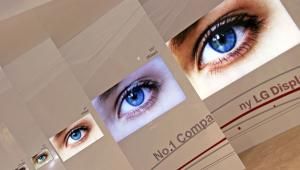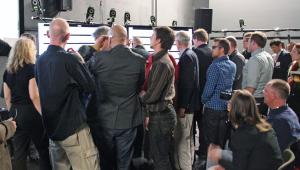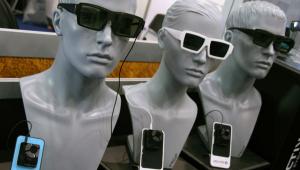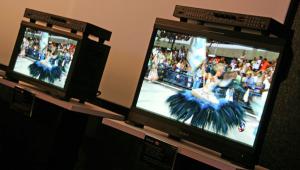Good Enough Isn't
Meanwhile, here are a few questions from John Morris that touch on some fundamental issues for many home-theater enthusiasts:
I was thinking about getting an upconverting player like the Pioneer Elite DV-48AV and wondering how that would compare to Blu-ray as far as picture quality goes. Will it make much of a difference compared with my older Denon player, which outputs 480p?
I have a Samsung HL-R5078 DLP RPTV. Does it upconvert the 480p signal from the Denon, or do I need an upconverting DVD player for that? How much improvement in picture quality do I get by upconverting 480p to "almost HD quality" (at least, that's what they say)? Is the scaler in the TV better than the Pioneer player's scaler?
My Marantz SR5001 A/V receiver has multichannel audio-input jacks. Can I use a hi-def disc player with multichannel outputs to hear the new audio formats (Dolby TrueHD and DTS-HD Master Audio), since my receiver does not decode the new signals? Would I need a new receiver for that? Do the new audio formats really give you enough benefit to make it worthwhile?
That's a lot of questions, John, but important ones. First of all, your Samsung TV does upconvert 480p (and even 480i) to 1080p. So the real question is whether the Pioneer DV-48AV does a better job of upconverting DVDs to 1080p than the TV. I don't know the answer for these specific products, but I can tell you that TVs often do a better job of upconverting than inexpensive DVD players.
The only way to know for sure is to try it both ways—enable the upconversion in the Pioneer and play a challenging movie clip, then disable it and play the same clip, causing the TV to do the upconversion. Which way looks better?
When I reviewed the HL-S5687, a similar but later Samsung RPTV than the one you have, I thought it's upconversion was quite good. On the other hand, at $300, the Pioneer is not exactly inexpensive for a DVD player these days, and it incorporates the company's own video processing, which is generally very good. So I suspect you won't see much difference either way—with the Pioneer doing the upconversion or letting the TV upconvert from the Denon.
The bigger question is this: How much better is true HD from Blu-ray compared with upconverted standard-def DVD? As you point out, many consumers claim that upconverted DVDs look "almost" as good as high-def on an HDTV, and that's good enough for them. My response is that anyone who makes this claim has never seen true HD—or their eyesight is severely impaired. In my view, the picture from Blu-ray (and HD DVD, for that matter) is far superior to any upconverted DVD, no matter how good the upconversion is. No video processor can create anything near the level of detail contained in a true HD source, and the difference is immediately apparent to anyone who's not blind.
If you're willing to spend $300 on an upconverting DVD player, I say bump up your budget a bit and get a Blu-ray player, of which there are several in the $400-$500 range, including the Sony PlayStation 3 and Panasonic DMP-BD30, two of the best. (You could actually spend less than $300 on an HD DVD player, but with all the recent news about that format's woes, I wouldn't recommend it at this point.) Blu-ray players deliver true high-def from the new format, and, with the exception of the PS3, they also upconvert DVDs, giving you the best of both worlds.
Virtually all Blu-ray players (again, except the PS3) have multichannel analog audio outputs that can connect to the corresponding inputs on your AVR, and the player does the decoding. Dolby TrueHD is normally decoded straight to PCM, but I don't know of any Blu-ray players that can yet decode DTS-HD Master Audio, which requires too much processor bandwidth. As a result, players usually extract the "core" datastream (that is, plain ol' DTS) from DTS-HD MA soundtracks, so you don't get the benefit of DTS-HD lossless encoding when using the multichannel audio outputs.
There are now AVRs that can decode DTS-HD MA in its full glory, so you can get a new one when your budget permits. In the meantime, you can enjoy almost all that Blu-ray has to offer using a multichannel analog audio connection to your current AVR. (In your particular case, I wouldn't recommend the PS3 because it has no multichannel output.) The new audio formats do offer significantly improved sound quality, so I say use them if you can.



























































